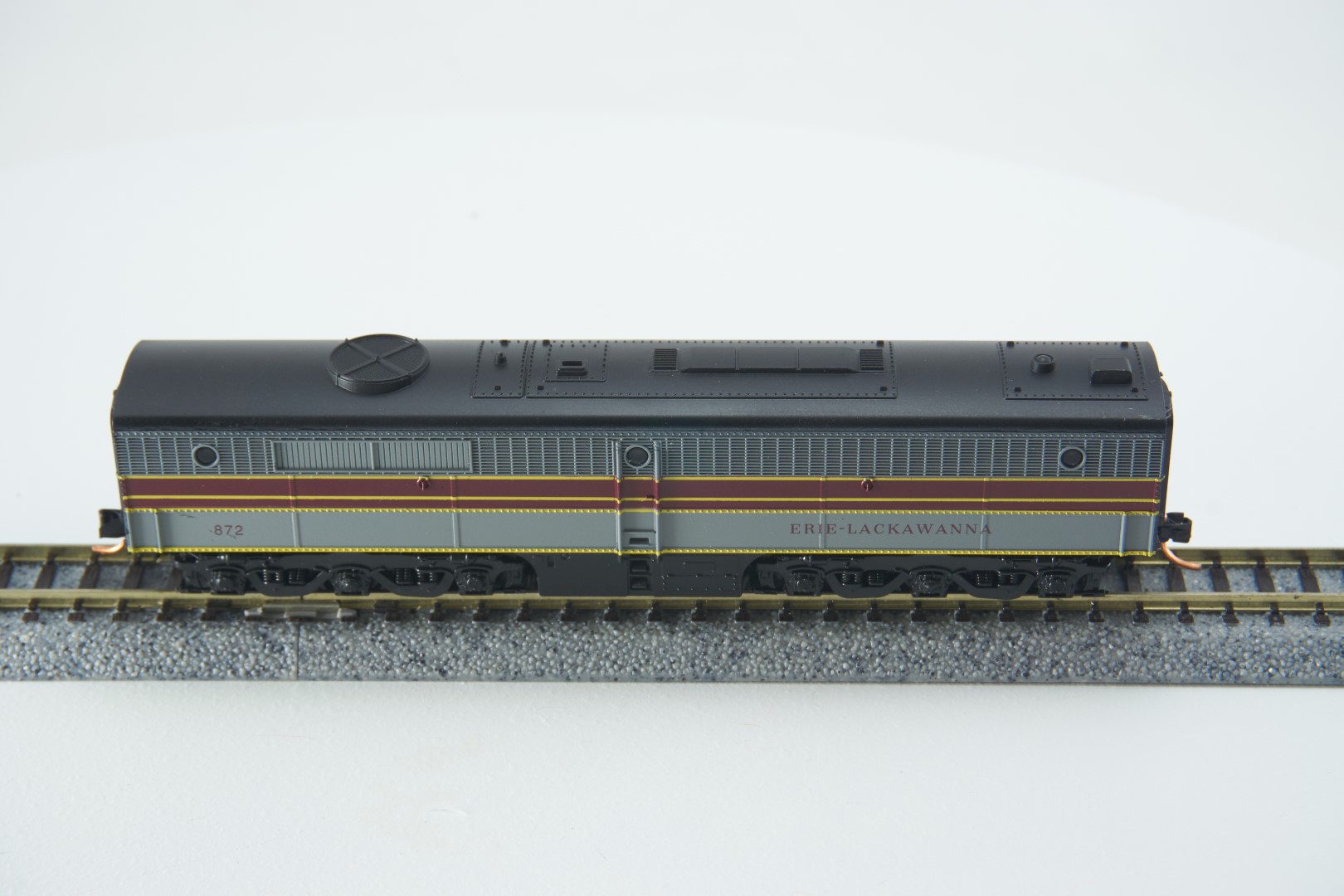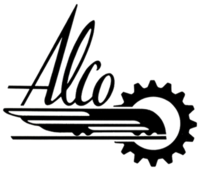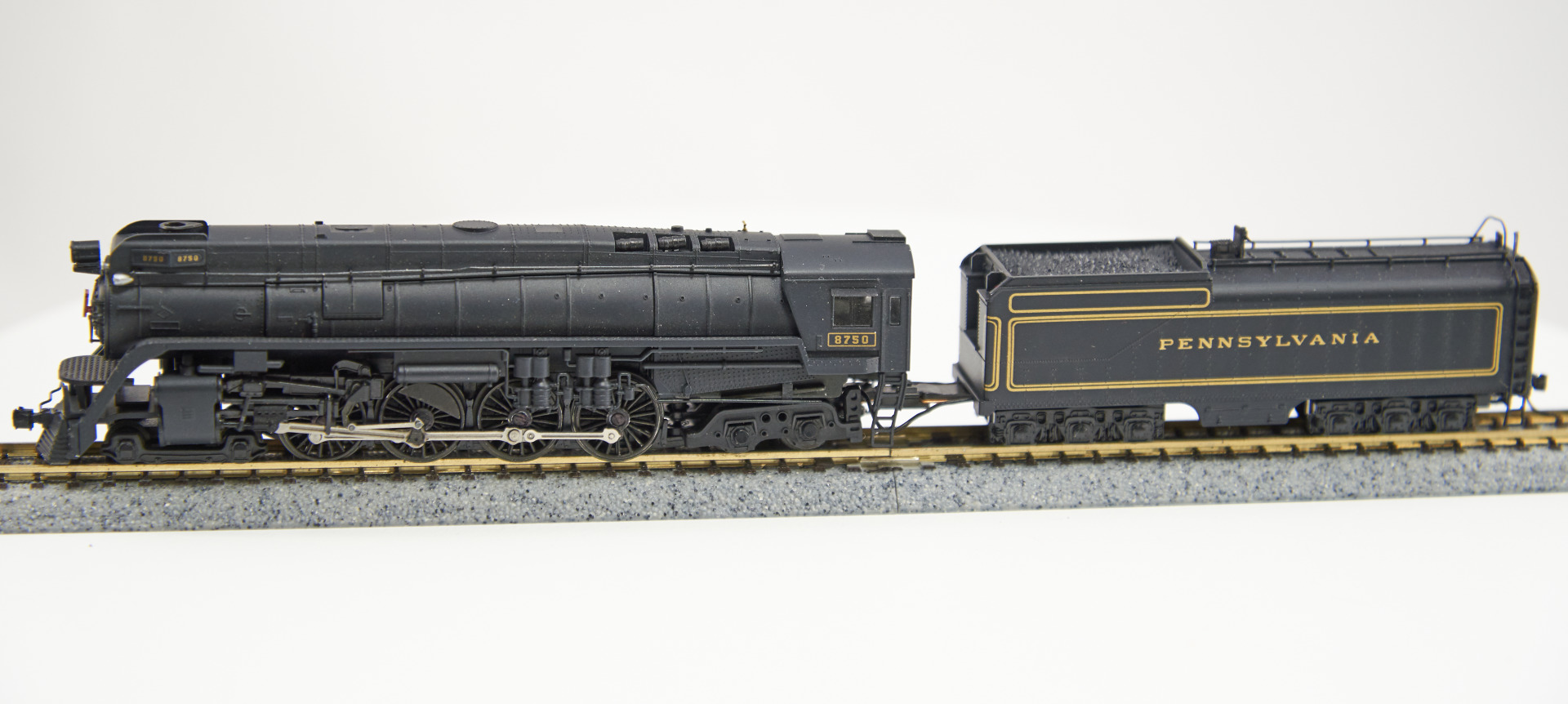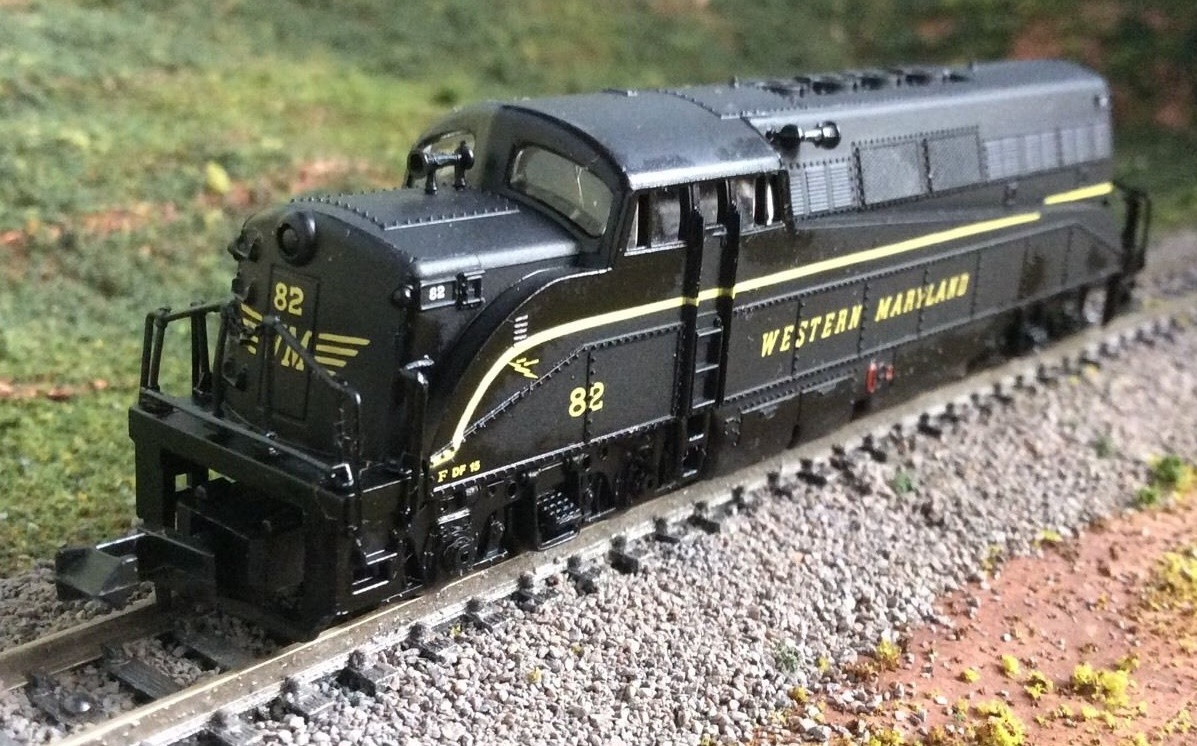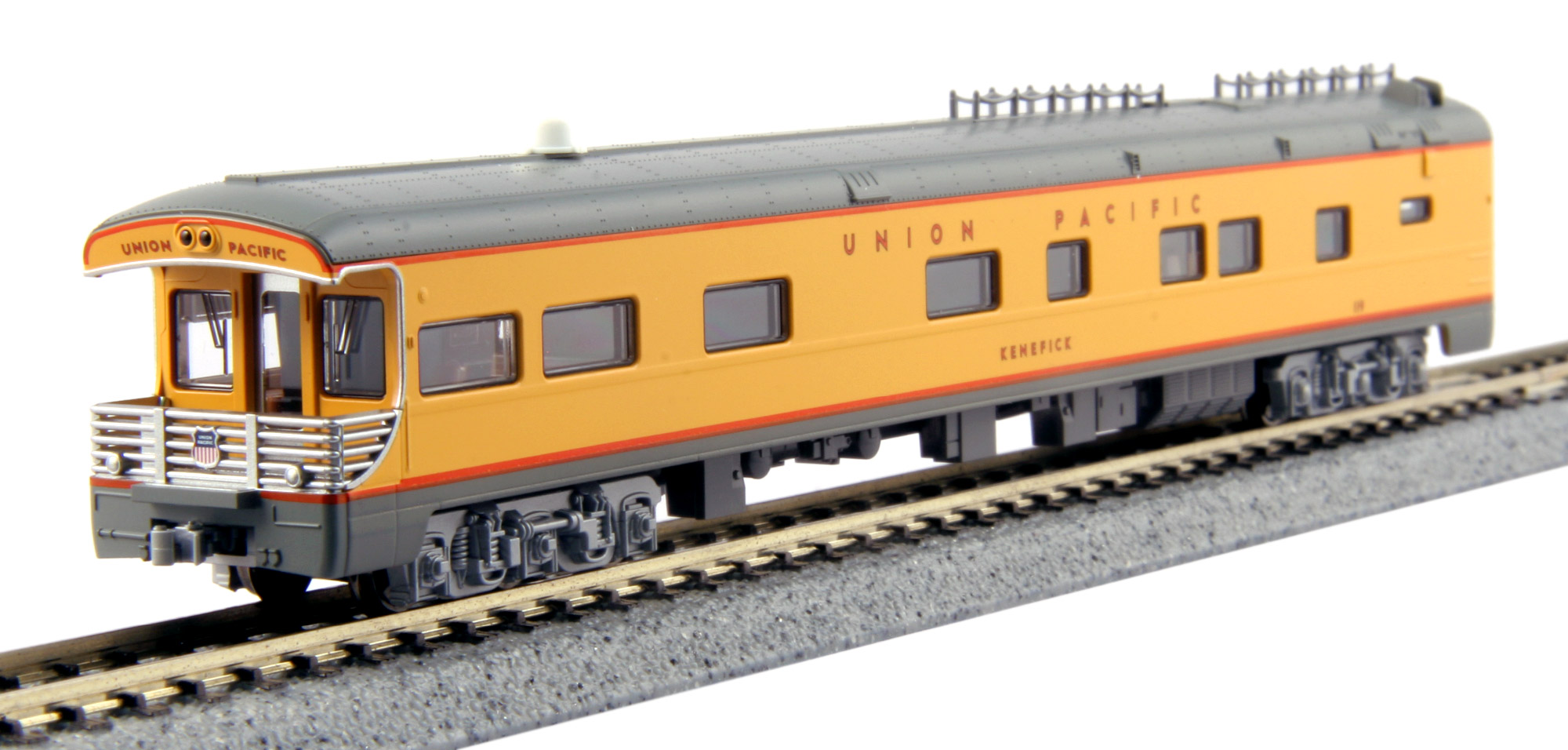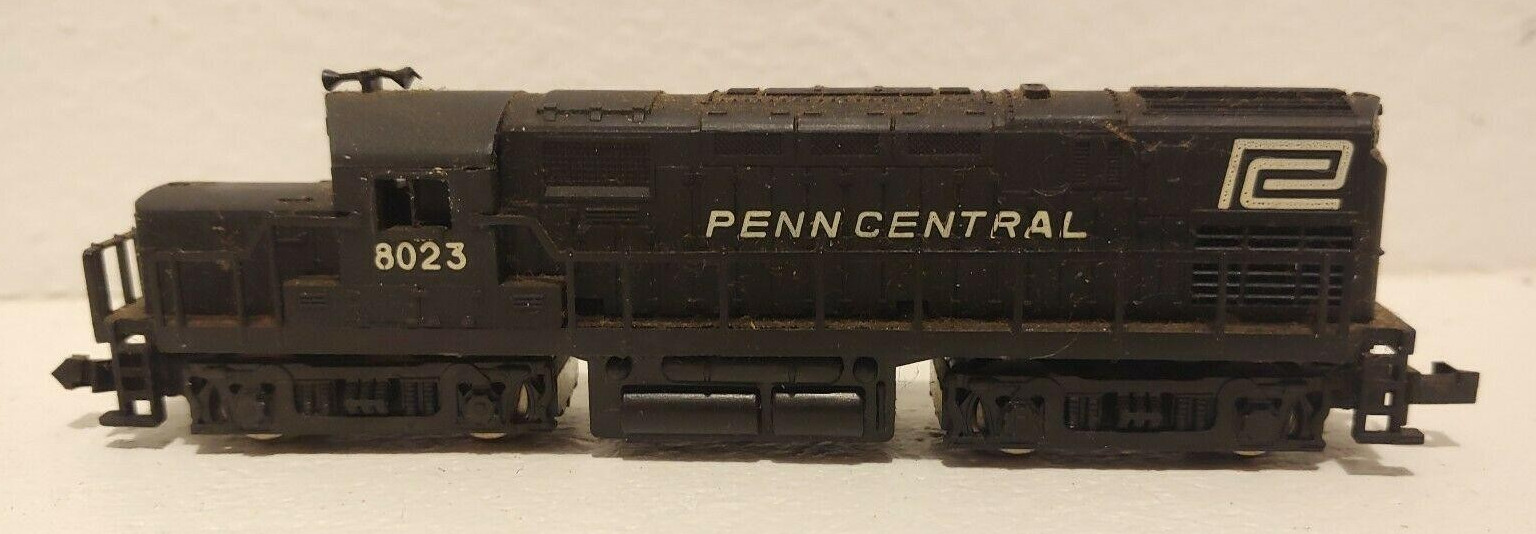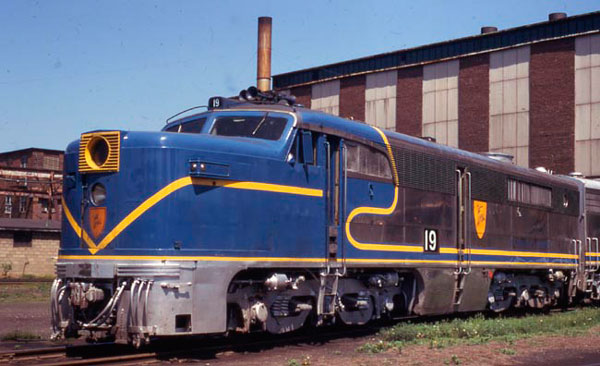Specific Item Information: This is an unpowered dummy unit with DCC sound.
Model Information: Con-Cor introduced these Kato-made locomotives in the late 1960s. Kato revised the mechanism in 1972 and in 1994 Con-Cor had a new mechanism made for Chinese production. In 2003, the engine was re-tooled again to be DCC-Ready.
2003 release: features of the powered PA-1 Unit.
2003 release: features of the powered PA-1 Unit.
- DUAL flywheel drive
- Comes with factory mounted Genuine Micro-Trains couplers
- Runs on “DC” right out the box.
- Factory installed DCC friendly PC 8 pin NMRA board.
- High Torque / Quiet 5 Pole skewed armature motor
- Reversing headlight
- Heavy die-cast chassis for superior pulling power
- Highly detailed body casting
- Detailed paint and printing
- Multi cab numbers available for Powered and non-Powered units
- Old bodies interchangeable with new units, so it will be easy to upgrade your older Con-Cor N PA-1 units to this new drive if you choose
DCC Information: All versions prior to 2003 are not DCC capable, but 2003 and later are DCC-Ready.
Prototype History: ALCO PA (DL-304/DL-305) refers to a family of A1A-A1A diesel locomotives built to haul high-speed passenger trains that were built in Schenectady, New York, in the United States by a partnership of the American Locomotive Company (ALCO) and General Electric (GE) between June, 1946 and December, 1953. They were of a cab unit design, and both cab-equipped lead A unit PA and cabless booster B unit PB models were built. ALCO's beautiful PA-1 is one of America's most famous locomotives. It was ALCO's entry into the passenger train diesel craze, competing directly with the E-Units from EMD. The first PA1 celebrated Alco's 75,000th loco to roll out of the erecting shop.
The PAs, as well as their cousins, the ALCO FAs, were born as a result of Alco's development of a new diesel engine design, the Model 244. In early 1944, development started on the new design. In 1946, this new locomotive made its debut on the Texas and New Orleans Railroad. Southern Pacific PA's #6055 and 6056 were later put into service on the SP's coastal division, pulling trains such as the Morning Daylight.
Having more horsepower than their leading competitor, Alco felt that they had a fleet-ready competitive product. PA1's were sleek, stylish, powerful, and were very well suited for America's passenger and fast freight trains. Additionally, their 65' 8" bodies became excellent billboard advertising for the railroads that they served with pride.
The PA-1/PB-1 were rated 2,000 hp (1,490 kW) and the PA-2/PB-2 2,250 hp (1,680 kW). A total of 297 PA/PB have been built between 1946 and 1953.
ALCO locomotives were also used in service with the famous "California Zephyr" passenger train, adopting a number of paint schemes, the most famous of which was perhaps the "Prospector" paint scheme. This paint scheme was a striking two-tone silver and gold arrangement, highlighted by a series of four black stripes going down the side of the body.
Read more on Wikipedia
and on American-Rails.com
The PAs, as well as their cousins, the ALCO FAs, were born as a result of Alco's development of a new diesel engine design, the Model 244. In early 1944, development started on the new design. In 1946, this new locomotive made its debut on the Texas and New Orleans Railroad. Southern Pacific PA's #6055 and 6056 were later put into service on the SP's coastal division, pulling trains such as the Morning Daylight.
Having more horsepower than their leading competitor, Alco felt that they had a fleet-ready competitive product. PA1's were sleek, stylish, powerful, and were very well suited for America's passenger and fast freight trains. Additionally, their 65' 8" bodies became excellent billboard advertising for the railroads that they served with pride.
The PA-1/PB-1 were rated 2,000 hp (1,490 kW) and the PA-2/PB-2 2,250 hp (1,680 kW). A total of 297 PA/PB have been built between 1946 and 1953.
ALCO locomotives were also used in service with the famous "California Zephyr" passenger train, adopting a number of paint schemes, the most famous of which was perhaps the "Prospector" paint scheme. This paint scheme was a striking two-tone silver and gold arrangement, highlighted by a series of four black stripes going down the side of the body.
Read more on Wikipedia
and on American-Rails.com
Road Name History:  The Erie Lackawanna Railway (reporting mark EL), known as the Erie Lackawanna Railroad until 1968, was formed from the 1960 merger of the Erie Railroad and the Delaware, Lackawanna & Western Railroad. The official motto of the line was "The Friendly Service Route".
The Erie Lackawanna Railway (reporting mark EL), known as the Erie Lackawanna Railroad until 1968, was formed from the 1960 merger of the Erie Railroad and the Delaware, Lackawanna & Western Railroad. The official motto of the line was "The Friendly Service Route".
Like many railroads in the northeast already financially vulnerable from the expanding U.S. Interstate Highway System, the line was severely weakened fiscally by the extent, duration and record flood levels due to Hurricane Agnes in 1972. It would never recover, and most of the corporation's holdings were subsumed into the federal rescue purchases creating Conrail in 1976, ending its days as an operating railroad company.
Read more on Wikipedia.

Like many railroads in the northeast already financially vulnerable from the expanding U.S. Interstate Highway System, the line was severely weakened fiscally by the extent, duration and record flood levels due to Hurricane Agnes in 1972. It would never recover, and most of the corporation's holdings were subsumed into the federal rescue purchases creating Conrail in 1976, ending its days as an operating railroad company.
Read more on Wikipedia.
Brand/Importer Information: Con-Cor has been in business since 1962. Many things have changed over time as originally they were a complete manufacturing operation in the USA and at one time had upwards of 45 employees. They not only designed the models,but they also built their own molds, did injection molding, painting, printing and packaging on their models.
Currently, most of their manufacturing has been moved overseas and now they import 90% of their products as totally finished goods, or in finished components. They only do some incidental manufacturing today within the USA.
Important Note: The Con-Cor product numbering can be very confusing. Please see here in the article how to properly enter Con-Cor stock numbers in the TroveStar database.
Currently, most of their manufacturing has been moved overseas and now they import 90% of their products as totally finished goods, or in finished components. They only do some incidental manufacturing today within the USA.
Important Note: The Con-Cor product numbering can be very confusing. Please see here in the article how to properly enter Con-Cor stock numbers in the TroveStar database.
Item created by: CNW400 on 2020-07-31 09:29:08
If you see errors or missing data in this entry, please feel free to log in and edit it. Anyone with a Gmail account can log in instantly.
If you see errors or missing data in this entry, please feel free to log in and edit it. Anyone with a Gmail account can log in instantly.


